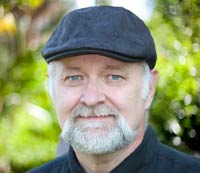A guest post by David Farland.
I love being a writer. In fact, I love it so much that it has probably spoiled me. I’m not sure that I’m even fit for a regular 9-5 job.
I’ve been asked to tell about some of my own writerly moments, those times when I just love my job. Here are a few:
Fun Writing Days. About five years ago I was at Cabo San Lucas on a writing retreat. I’d awakened just before dawn, and walked out on the beach to write as the sun rose—a ball of molten silver with magenta highlights, rising above a purple mist. The wind was perfectly still as the sun ascended above the ocean, and I got into the writing groove. I got lost in a scene, writing as fast as I could until the beach warmed enough so that the iguanas began to come out to sun on a nearby wall, then I went into my room and just kept writing until the sun went down. I love it on days like that, where you get lost in the work.
Changing Peoples’ Lives. Recently I got a letter from a fan who was ill with a terminal disease. For the past six years he has been hooked to a morphine pump, and he wrote to tell me that he had read my Runelords series many times. He said that he found that when he read my books, they transported him into another world, and he forgot about his pain—to the point where his nurse could turn off the morphine pump for a few hours. I’ve gotten similar letters over the years, and each one touches me anew.
Surprise Paychecks. Everyone knows that writers don’t make a lot of money, right? But every once in a while I’ll get a paycheck that surprises me. A few years ago, we had a nice foreign rights sale to a publisher that came in just before Christmas. An extra $100,000 sure helped add to the holiday cheer.
Helping Other Writers. Four years ago, my novel In the Company of Angels went up for the Whitney Award for Best Novel of the Year. I was invited to attend the awards event, and was given a lifetime achievement award for my work in helping discover and promote new writers. As the spokesman announced the award, he asked members of the audience “Who among you has taken classes from Dave?” Perhaps 20% of the audience rose. He then asked, “How many of you have read articles or books by Dave?” and perhaps another 60% of the audience stood. He then asked, “How many of you have read novels by any of the authors who are standing?” and everyone stood.
It really brought home to me that my work isn’t just about writing. Sometimes it’s about teaching. Some of my students have far surpassed me in reputation. The incident reminded me that each of us is like a stone dropped into a still pool, and our influence reaches out and moves others, touches everyone, in ways that may never be aware of.
I was happy to take home two awards that day—one for my work as a teacher, and one for “Best Novel of the Year.”
Many authors know the thrill of seeing their first book in print, or getting their first great review, or hitting a bestseller list. But there are so many touching moments associated with this job, I don’t think that I could list them all. It’s not something that you can really talk about. It’s something you have to live.
David Farland is an award-winning, international best-selling author with over 50 novels in print. He has won the Philip K. Dick Memorial Special Award for “Best Novel in the English Language” for his science fiction novel On My Way to Paradise, the Whitney Award for “Best Novel of the Year” for his historical novel In the Company of Angels, and he has won over seven awards—including the International Book Award and the Hollywood Book Festival, Grand Prize—for his fantasy thriller Nightingale. He is best known, however, for his New York Times best-selling fantasy series The Runelords, which will soon be made into a graphic novel and, likely, a movie.
Farland has written for major franchises such as Star Wars and The Mummy. He has worked in Hollywood greenlighting movies and doctoring scripts. He has been a movie producer, and he has even lived in China working as a screenwriter for a major fantasy film franchise.
As a writing instructor, Farland has mentored dozens who have gone on to staggering literary success, including such #1 New York Times Bestsellers as Brandon Mull (Fablehaven), Brandon Sanderson (Wheel of Time), James Dashner (The Maze Runner) and Stephenie Meyer (Twilight).
Farland judges L. Ron Hubbard’s Writers of the Future, the one of the largest worldwide writing competitions for new fantasy and science fiction authors. In the video game industry, he has been both a designer and a scripter and was the co-leader on the design team for StarCraft: Brood War. He set the Guinness World Record for the largest single-author, single-book signing.
David Farland has been hailed as “The wizard of storytelling” and his work has been called “compelling,” “engrossing,” “powerful,” “profound,” and “ultimately life-changing.”

